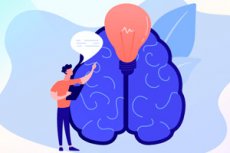Medical expert of the article
New publications
Stages of critical thinking
Last reviewed: 29.06.2025

All iLive content is medically reviewed or fact checked to ensure as much factual accuracy as possible.
We have strict sourcing guidelines and only link to reputable media sites, academic research institutions and, whenever possible, medically peer reviewed studies. Note that the numbers in parentheses ([1], [2], etc.) are clickable links to these studies.
If you feel that any of our content is inaccurate, out-of-date, or otherwise questionable, please select it and press Ctrl + Enter.

The development of critical thinking is a process that involves several stages, from initial awareness of the need to critically analyze information to its full integration into ways of thinking and decision making. There are many theories describing these stages, and one of them is Richard Paul and Linda Elder's model of critical thinking development. It includes the following stages:
1. Stage One: The Unreflective Thinker (Stage One: The Unreflective Thinker)
At this stage, the person rarely questions the quality of his or her own thinking. Decisions are often made on the basis of biases and subjective opinions not supported by evidence.
2. Stage Two: The Challenged Thinker (Stage Two: The Challenged Thinker)
People are beginning to realize that their thought processes may be biased or limited. They encounter situations that require deeper analysis, and this sparks an interest in developing critical thinking.
Stage Three: The Beginning Thinker (Stage Three: The Beginning Thinker)
At this stage, individuals begin to recognize the importance of thinking standards and seek to actively use strategies to improve their thought processes. However, consistency and discipline in the application of critical thinking can be difficult at this level.
4. Stage Four: The Practicing Thinker (Stage Four: The Practicing Thinker)
Individuals in this stage already apply critical thinking more consistently in everyday life. They develop and use strategies to improve their thinking, but may still sometimes find it difficult to apply.
5. Stage Five: The Advanced Thinker (Stage Five: The Advanced Thinker)
At this stage, critical thinking begins to be integrated into life. People are able to critically analyze and evaluate their own beliefs and opinions, as well as others' arguments, while being aware of their cognitive biases and errors.
6. Stage Six: The Accomplished Thinker (Stage Six: The Accomplished Thinker)
In this stage, people continually use critical thinking to solve complex problems. They understand the complexity and multifaceted nature of reality and strive to continuously improve their thinking skills and strategies.
These stages are not strictly sequential, and an individual may fall between them or experience backward movement along their developmental path. A deliberate approach to learning and self-development can accelerate the transition from one stage to the next and foster a deeper mastery of critical thinking skills.
7. Mastery (Stage Seven: The Master Thinker)
At this stage, critical thinking becomes second nature. A master thinker is able to quickly analyze information, draw sound conclusions, and solve complex problems with a high degree of accuracy. These thinkers are also capable of effective self-regulation and self-criticism.
8. Expert Thinking (Stage Eight: The Expert Thinker)
Experts in critical thinking can not only solve problems effectively, but also create new methods for analyzing and understanding information. They are often innovators in their fields, able to see beyond standard approaches and develop new theories and practices.
Each stage of critical thinking development involves a deepening of skills and broadening of understanding that allows the individual to analyze information more deeply and accurately, avoid cognitive distortions, and better understand the world around them. However, it is important to understand that these stages are idealized representations of the thinking development process and that in real life, progress may not be linear and may include periods of stagnation or even regression.
The importance of critical thinking in today's world cannot be overemphasized. It is needed in all spheres of life: from personal finance to global politics, from everyday communication to scientific research. The development of critical thinking should begin at an early age and continue throughout life, as it is a key component of successful adaptation to a rapidly changing world and effective problem solving in all areas of human endeavor.

